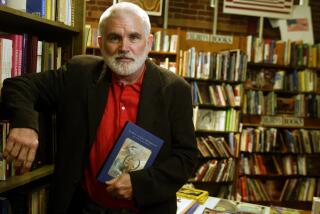‘CONVOY’S’ DAVIS RIDES AGAIN--ON STEAMROLLER
- Share via
As the man behind the classical-rock hybrid Mannheim Steamroller, Chip Davis has earned a good deal of respect in some rather snooty circles. Recent compositions of his have been recorded with the London Symphony, and Mannheim Steamroller’s pristine-sounding series of albums are favorites among notoriously fussy audiophiles.
Davis’ best-known work, however, rates at the opposite end of the snob scale: “Convoy,” a novelty country song, sold several million copies in 1976 at the height of the citizen’s band radio craze.
“I said the one thing I wouldn’t write was country music,” the 39-year-old Davis said, recalling the time he took a job as musical director at an Omaha, Neb., recording studio in the early ‘70s. “I said, ‘I’ll do anything but country.’ ”
But when advertising agency executive Bill Fries needed a country tune for a client, country is exactly what Davis--a former bassoon student and Toledo Symphony Orchestra member--found himself doing. And when the resulting jingle proved popular locally, Davis and Fries decided to re-record it for release as a single. This led to a string of country hits for Fries, recording under the name C. W. McCall, with Davis co-writing and producing.
“During all this time I’d been writing this ‘Fresh Aire’ stuff as a hobby, trying to take rock ‘n’ roll ideas and intermingle them with classical forms,” Davis said by phone from Salt Lake City. He termed this style “18th-Century rock ‘n’ roll.”
Mannheim Steamroller’s success is nearly as surprising as its roots. In a field where visibility is usually considered essential, the group has virtually had no radio air play and minimal press coverage. Its rare concert appearances include a four-night engagement at the Wiltern Theatre starting Thursday.
Yet on a largely word-of-mouth basis, its six albums in the “Fresh Aire” series have each sold in the hundreds of thousands, and a 1985 Christmas collection recently surpassed the 500,000 mark. The current tour, featuring Davis on percussion and his longtime keyboard partner Jackson Berkey augmented by as many as 20 other musicians and elaborate slide and film projections, is filling houses at every stop.
A particular boon has been the rise of so-called New Age music, in which the Steamroller’s hard-to-categorize records are often lumped. Though Davis resents his compositions being associated with music that’s widely criticized as “yuppie elevator music,” he welcomes the genre’s rise.
“It’s the best thing that’s ever happened to us,” he said, “because a lot of times record stores put my stuff in easy listening or jazz or who-knows-what sections and fans can’t find it. Now that there are New Age sections people know where to look.”
Actually, Mannheim Steamroller does get some air play, turning up regularly as between-segments filler on National Public Radio news shows and behind sports highlights segments on television news programs. But this is air play that comes without any sort of identification as to who the artist is.
“We get a lot of play on ABC television,” Davis said. “In fact, ‘Come Home to the Sea’ from our latest album, ‘Fresh Aire IV,’ ran whole during the tall ships parade last Fourth of July (in New York).
“ABC got so flooded with letters that they sent them on to me. The guy at the network’s music library said it was the most response that he could remember, and I got a very nice letter from (ABC executive) Roone Arledge.”
Having been built outside normal channels, the Mannheim Steamroller audience is difficult to assess, according to Davis.
“In the theater you see kids and their grandparents,” he said. “I’ve seen people in T-shirts and blue jeans sitting next to a guy in a tux.”
The one thing he says links the diverse fans is that they feel a loyalty to him and his music--and he tries to be loyal back.
“They expect certain things from me,” he said. “I’m probably not going to come out with ‘Fresh Aire IX’ sounding like (electronic composer Karlheinz) Stockhausen and hang a big left on them.
“But then,” he said with a mischievous laugh, “I said I wouldn’t write country, too.”
More to Read
The biggest entertainment stories
Get our big stories about Hollywood, film, television, music, arts, culture and more right in your inbox as soon as they publish.
You may occasionally receive promotional content from the Los Angeles Times.










